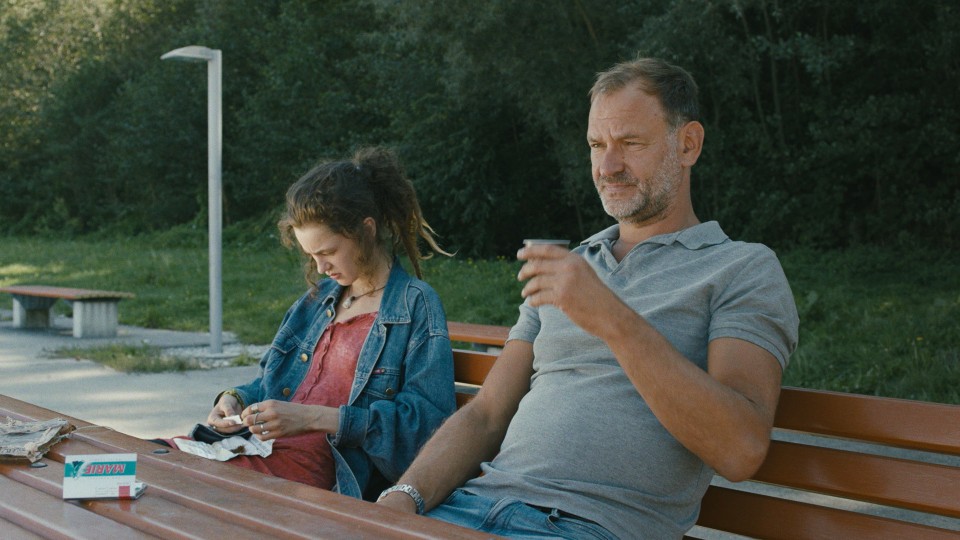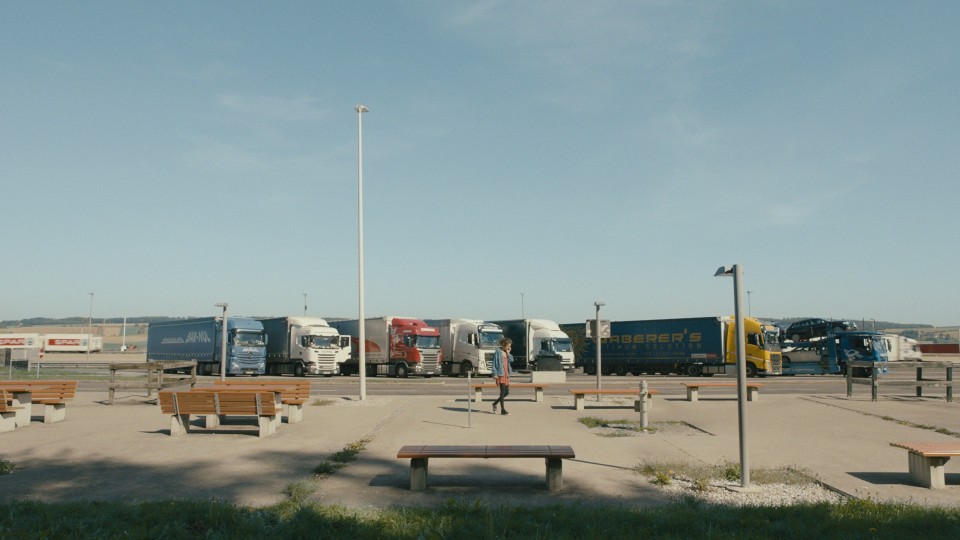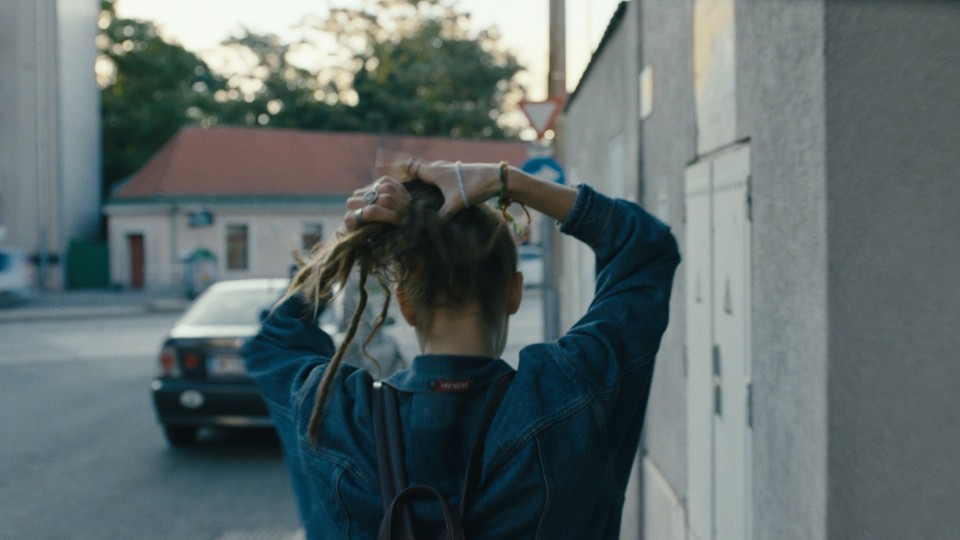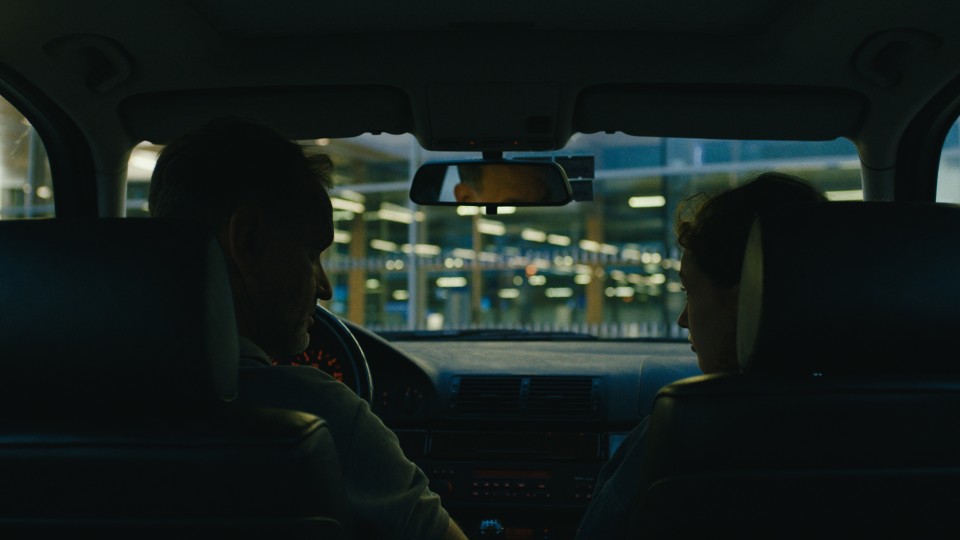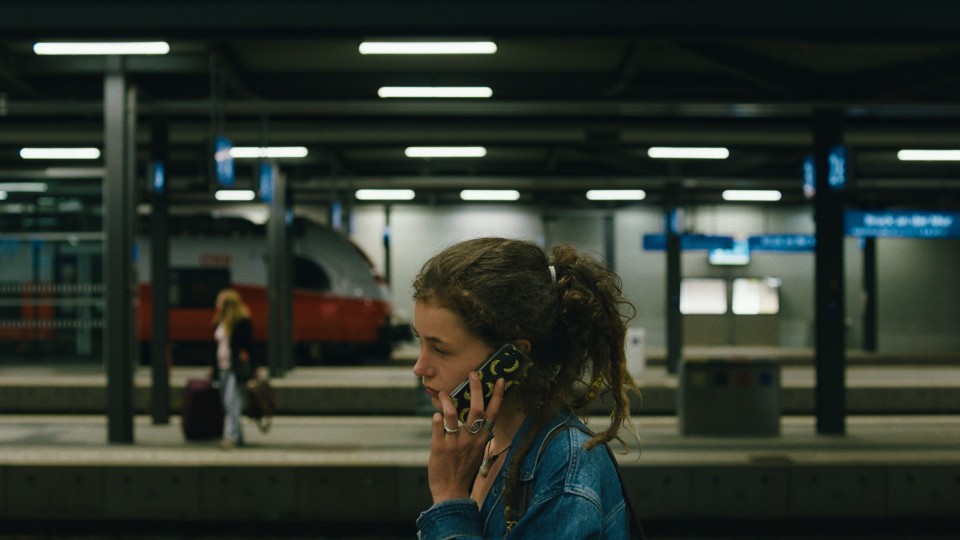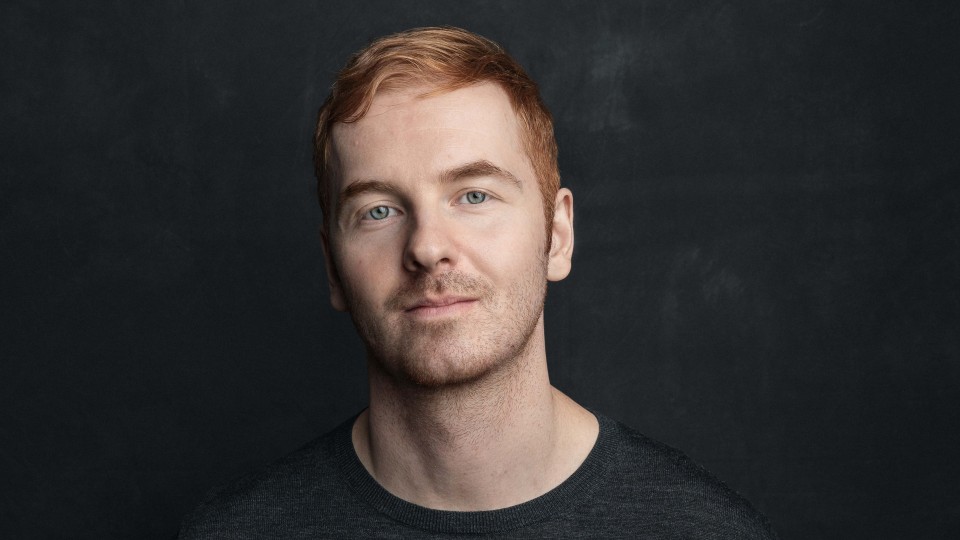Martin Monk wondered how far he could go with a road movie in short film format – and resolved to confront the clear
formal challenge. In Favourites he tells the story of an accidental encounter between a 17-year-old girl hitchhiker and a car driver who could be her father,
a brief interaction between two generations and their unanswered questions about life. In fact the project has taken the student
of directing at the Vienna Film Academy a long way: he has been awarded a place in the Cinéfondation series, the
section for young talent at the Cannes Film Festival.
Your protagonist Sofia walks out of a house and tries to hitchhike on a busy road leading out of Vienna. The action in Favourites begins with the direct consequence of an incident we only learn about gradually. Why did you choose this form of opening?
MARTIN MONK: For short films in particular, the first scene is extremely important. You can lose the audience very quickly. One of our
principles was to work in documentary style and film at original locations. During the scriptwriting phase we discussed in
great detail the idea of hitchhiking, and the question arose of whether people actually do it at all these days. I discovered
from my research that people hitchhike mainly due to the appeal of making spontaneous contact with strangers. In Favourites this encounter entails the possibility of conflict. I was also interested in playing with the feeling of threat, in the sense
that you don't really know what's going to happen to the young woman. On the basis of all these ideas I decided to jump into
the film in this direct way. Using an uninterrupted cut was a decision that I only finally made during the editing process,
in discussion with my editor Felix Kalaivanan. We did experiment with other variations, but then we came to the conclusion
that this one take was the best way of drawing the audience into the film.
The title Favourites, or Favoriten, has a special local connotation for people from Vienna, denominating the large southern district, as well as having a metaphorical
sense. How would you like this double sense to be read?
MARTIN MONK: It's slightly ironic with regards to the characters.. „Favourites“ is a term from sports, about reaching the finishing
line first. I found that quite fitting in connection to the road movie genre. At the same time, there's the question: who
is whose favourite? You can extend that to the audience: who becomes their favourite in the course of the film? As a German
film maker, I thought using the double meaning was slightly cheeky, or sarcastic, as it was also me trying to connect to the
local area. But it was hard finding a title and took a long time. I had many ideas that I scrapped again, and found the eventual
title rather late. I'm very happy with it.
Even though one meaning of the film title is the name of a concrete location – the 10th district of Vienna in the south of the city – the film itself is shot solely in places which can't be located: a main
road leading out of a city, a highway, a gas station. Everything is in motion, and everyone moves in their own way. A fundamental
theme that runs through the film is the question: is anyone going to give me a lift? Were these your thoughts while you were
writing the screenplay?
MARTIN MONK: My first idea was about the genre of the road movie, and I started wondering whether it could be applied in a short film.
Another question concerning my two protagonists is which of them finds this encounter more significant. At first glance it
would seem to be Sofia, but when you look closer it's Michael, who is old enough to be her father. He is confronted by issues
he had managed to sweep aside until that point. And although Sofia approaches hitchhiking in a very innocent and naive way,
she never undervalues herself. That also allows us to play with the concept of victim and perpetrator: the audience has to
decide who to trust. I'm interested in the idea of undefined locations because while we were filming on the highway we had
a lot of contact with ASFINAG, the Highways Authority in Austria, and those people told us again and again that Austria is
a transit country with a huge amount of traffic. A country you drive through. And that also applies to Sofia, who is trying
to get to Italy. As part of my research I spent a long time driving through Austria – travelling in general, and in particular
car journeys, appeal to me a lot. I wanted to explore that atmosphere.
In Favourites, the car isn't just a means of transportation towards a destination, it's also a protective shell, within which people can
hide. There are many scenes shot in the car, where the gaze isn't outwards, but onto two people in a very confined space.
What does the object “car” stand for?
MARTIN MONK: I think the car as a boundary, or protection against the outside world plays an important role. Hitchhiking helps to
dramatize this because it breaks apart the privacy and perhaps feeling of omnipotence that you might have as a driver. Michael
is genuinely perturbed by Sofia. The social rules are somehow newly written in the confrontation with a hitchhiker, while
they are simultaneously reinforced and reenacted. We didn't stage anything in the very first scene, where Sofia knocks on
the car windows of strangers to ask for a ride. It was really interesting to see the authentic and very different reactions
of the drivers.
The tone of the conversation between Sofia and Michael is fairly aggressive, especially at the beginning, without any real
reason for this being given. To what extent are they each projecting their own dissatisfaction on to the other generation
(in Sofia's case) or the other sex (in Michael‘s)? Sometimes they seem to interact like father and daughter, sometimes
like man and wife.
MARTIN MONK: I would definitely go along with that. It was a question which concerned us a lot while we were developing the characters.
The basic energy underpinning the relationship between the two main characters in the film is something Lia and Christian
themselves brought along – and that's also why I chose them. The idea that Sofia is most affected by the conflict between
the generations, while Michael is far more marked by the friction between the sexes, is certainly accurate. So how can a situation
be created where things can change for both of them? That was another crucial point in terms of dramaturgy. And it's not at
all so simple. The question of why Michael is so grumpy from the very start is certainly a valid one, but after conversations
with Christian Dolezal I decided that in a short film it doesn't have to be explained so clearly. Especially since Sofia is
intended to be the main protagonist.
How did you find the two actors, Lia Wilfing and Christian Dolezal? Which aspects of their personal stories did they add to
their characters?
MARTIN MONK: As part of my studies I put a lot of work into looking for material for a short film. Then the idea of a road movie featuring
a young woman began to solidify, and by complete chance I met Lia. I had worked with a colleague from the Filmakademie on
casting, and that's how I discovered her. She was so great at improvisation that I immediately approached her. First of all
we met a number of times, and during our conversations – not only about the film – some subjects arose which
I include in the screenplay. It was very quickly clear that she was able to contribute aspects of her own experience. Lia
is very open and accessible, and I regard her as a natural talent. In contrast, casting Christian Dolezal came about in a
completely different way. I found him through a professional casting agent, Iris Baumüller. I arranged for the two of them
to meet so they could get to know each other, and we had a rehearsal at the gas station just before shooting. It seemed to
me that the only sensible place to rehearse this film was at the original locations. In fact nothing else would have been
possible anyway because of the time pressure.
It has been said that you also permitted input from the actors. How precisely is your screenplay scripted?
MARTIN MONK: I'd say 90% of the dialogue is written down. But for this project I also tried out lots of things, improvised and added material.
Interestingly enough, a large proportion of that was then cut during editing. Generally I write about 30% more dialogue than
I need, sometimes addressing the subtext, and then remove a lot of it afterwards. Since I was working with Austrian actors
I made a point of checking the linguistic aspect on an ongoing basis, making sure with the actors that the nuances were all
correct. I certainly didn't want it to sound as though a German person was trying to write Austrian dialogue. In that sense
the shaping of the dialogue was rather more flexible for this project, which also meant giving the actors more responsibility.
Sofia's character constantly features movement to and fro, forwards and backwards. I'm thinking of her repeated attempts to
get a lift, each time adopting a different attitude. At the end of the film we don't know which direction her journey will
take her next. Were you also attempting to depict something of the inner conflict of a 17-year-old?
MARTIN MONK: I would be very careful about that. I don't want to sound patronizing, as if I'm saying: "That's what being 17 is like".
It's important to me that this feeling of inner conflict is presented independent of age. At the same time, it had to be a
young woman in order to capture the innocence that Sofia brings to the role. And I’m familiar myself with the attitude
towards life that runs through her. On top of this there‘s the idea that Michael doesn't actually feel so very different
when they meet. He doesn't have any answers either, after all. The way Sofia uses different strategies, experimenting, has
something youthful about it. She is asking herself: "How do I come across?" When you're older you have usually decided on
one variation of yourself. I regard the feeling of inner strife as a common emotion, not restricted to any particular age
group. FAVOURITES is about family – and family is an integral part of life itself.
The fact that a lot of information remains off-screen doesn't just seem to be due to the short film genre. The film depicts
a chance encounter, where two people share a brief moment, that could mean nothing or mean so much that it changes something
in their lives. But you leave that open...
MARTIN MONK: I find the limited duration of shorts very exciting. Backstory is largely off the table. Shorts are interesting in that way
because they force the audience to engage, take part, combine clues, remain alert. Also, the short film genre is quite unchartered
theoretical terrain. There's not nearly as much literature as for features, obviously. Regarding leaving things open, I don't
want to force my position onto anyone, but I think there are some obvious hints. The atmosphere of a film already transports
a lot of content and hence meaning.
You are currently studying in the Master's directing degree at Film Academy Vienna. Surely you're engaging with ideas and
stories beyond the short form genre, that you're developing. Are there any particular ways of telling stories, or concrete
directing styles, that you gravitate towards?
MARTIN MONK: Not consciously, or actively. I try to listen to my inner voice. But of course you pick up many things watching other people's
work, some of which find their way into your own material, sometimes via a detour. I think one has to be watchful for that.
Your own ideas might not always be your own ideas. But I've never tried very specifically to imitate something. What I've
been interested recently is structure, as in Favourites, which engages with the road-movie genre conventions to a certain
extent. A genre can give a broad framework to the writing and it can help to get the ball rolling. Right now I'm very interested
in settings that put characters in unusual, non-mundane situations. Not the break itself from mundane to extraordinary, but
jumping straight into the non-mundane. That's what inspires me at the moment. I don't know where that comes from.
You have been invited to bring Favourites to the Cinéfondation series, where work created at film school is given a special place in the official selection for the
Cannes Film Festival. How did you come to study at the Vienna Film Academy?
MARTIN MONK: I spent a total of seven years at universities in London, Paris and Berlin studying humanities: a Bachelor’s in History
and Literature, and a Master’s in Cultural Studies. I started working with film parallel to my studies, off my own bat,
and I applied to film schools in Germany three times; I got on the shortlist but was never accepted. I carried on making films,
including a 20-minute production that was shown at some festivals. By that point I had almost given up the idea of going to
film school at all, but then I discovered that the Vienna Film Academy also offers a Master’s course. And I very much
liked the idea of having Michael Haneke as a professor. So I just sent off an application, and I didn't really think very
much about it. I was invited for an interview, and in the end I was the only external student accepted on the Master’s
course. It gave me a sense of personal satisfaction. And I would never have been invited to the Cinéfondation if I hadn't gone to film school. It really does open doors.
What does the invitation to Cannes mean, apart from a lot of pleasure?
MARTIN MONK: I won't really be able to describe it until I'm actually there. But one part is the feeling that working towards becoming
a director for all those years wasn’t just a pipe dream. To get a film made you need an awful lot of money, as well as
a huge number of people who believe in you and are prepared to work very hard with you and for you. It's creative work that
is carried on the backs of a large number of people – unlike writing a novel, for example. And that's why you need a
sense of responsibility about it as well, an appreciation of what that collaboration means. An invitation to such an important
festival event as the Cinéfondation takes a weight off my shoulders in a way, and it encourages me to carry on. As well as all that, I'm pleased for everybody
who was involved, because it gives them the confirmation that all their effort was worthwhile. If FAVOURITES had been shown
at a different festival we could have been very proud – but Cannes is simply the icing on the cake.
Interview: Karin Schiefer
April 2019
Translation: Charles Osborne / Martin Monk

